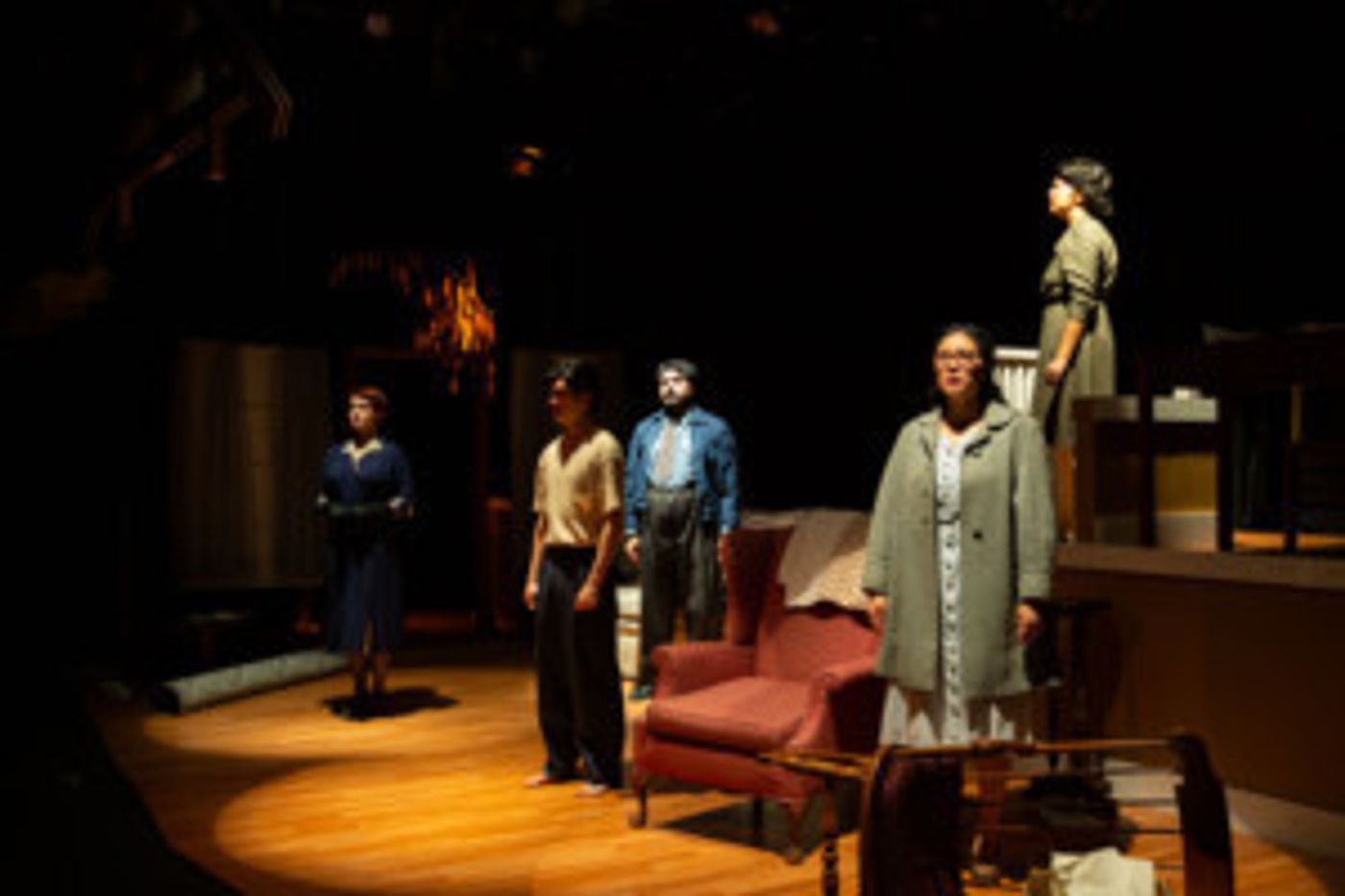Review: The Hub Theatre's AMERICAN SPIES AND OTHER HOMEGROWN FABLES premieres at NextStop Theatre

Sam Hamashima's American Spies and Other Homegrown Fables focuses on a Japanese family grappling with the aftermath of Pearl Harbor. George (Kramer Kwalick) is interested in learning Japanese traditions and language with the guidance of his family's spirits, Paper Crane (Rae Venna) and Maneki Neko (Phillip Reid), an eccentric lucky cat. George's mother, Natsuko (Toni Rae Salmi), tells George that they can't continue to embrace their Japanese identity because she was warned by their neighbor, Diane (Carolyn Kashner) that the government is watching anyone who is Japanese. George's father, Tamihei (Dylan Arredondo), comes home to tell George and Natsuko that they and their other Japanese neighbors including Miss Nakayama (KyoSin Kang) are setting up a fire to destroy traces of their Japanese heritage even the valuable family trinkets. While the family struggles to deal with the implications of the impending fire, George deals with the emotions of his first crush. The Hub Theatre's production of American Spies and Other Homegrown Fables, directed by Kathryn Chase Bryer, features powerful moments, but certain artistic choices prevent the production from making its full impact.
American Spies layers realism and magical elements. At first, it is hard to tell that Maneki Neko and Paper Crane are spirits. It isn't apparent of who they are until they begin to gravitate more towards their "real life counterparts," which are the trinkets sitting on a table in the family's living room. As the production goes on, it becomes more apparent that Maneki Neko and Paper Crane aren't from the real world. Paper Crane conjures music to play on the radio and Maneki Neko summons his thunder-like powers to save the family from evil. Reid's Maneki Neko and Venna's Paper Crane provide comedic relief which is a nice break from the tension of what George and his family are going through. It is fun to watch Reid and Venna play off each other during a scene in which they discover George's first crush. In one of the more interesting scenes with one of the spirits, Venna's Paper Crane tells George a Japanese fable called "The Crane Wife." The concept of fables is one of the many underlying themes, but this is the only fable which is told in the play. Since the title of the play mentions "fables," it is disappointing that only one Japanese fable is told. Besides the spirits, buzzards dive in and out of the production and ominously hover over the family. With the spirits and the buzzards being the only magical elements in the production, there is a need to have more spirits and characters from Japanese fables appear in American Spies to provide more layers of magic to contrast with the real world. The powerful moments within American Spies involve the family's interactions with others outside of their home. In one particular scene, Tamihei comes home followed by a police officer who says that he has to write Tamiehi a ticket for a "broken tail light." Another tense scene involves Diane and Natsuko sitting in the living room discussing how she is going to be her "American mentor." The cast handles these scenes well through showing the intensity with their mannerisms and body language. Kwalick plays George with this quiet innocence. As with all teenagers, George is trying to figure out his identity and how he fits into the world at a troubling time. Kwalick is able to express George's sense of conflict between his identities on stage throughout his interactions with the beloved family spirits and his mother.
While the cast creates these powerful moments, there are certain production elements which break the audience out of the story. Between scenes, there is abrasive music which doesn't fit in with the time period of the play and takes away from the emotional impact of the previous scene. At times, the actors' positions and movements on stage aren't quite clear and don't flow well. Towards the beginning as George is writing kanji and the spirits are introduced, it is confusing to understand exactly what is going on. During a fight scene involving the buzzards, the choreography feels stiff and not flowing as smoothly as it should.
Despite certain production elements, The Hub Theatre's American Spies and Other Homegrown Fables is able to capture some powerful moments and sheds light on the story of Japanese Americans during World War II which needs to be told more both on and off stage.
American Spies and Other Homegrown Fables runs until August 4, 2019 at NextStop Theatre.
Running Time: 70 minutes with no intermission
Photo caption and credit: Carolyn Kashner, Kramer Kwalick, Dylan Arredondo, KyoSin Kang, and Toni Rae Salmi in The Hub Theatre's production of American Spies and Other Homegrown Fables. Photo by Ryan Maxwell Photography.
Reader Reviews
Videos


